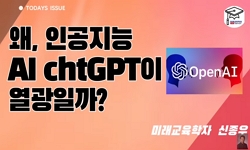Purpose: This study aims to examine ethical issues following the emergence of ChatGPT, evaluate ChatGPT with a focus on moral competence, and seek ethical solutions. Methods: This study tries to use various literature and various media reports from t...
http://chineseinput.net/에서 pinyin(병음)방식으로 중국어를 변환할 수 있습니다.
변환된 중국어를 복사하여 사용하시면 됩니다.
- 中文 을 입력하시려면 zhongwen을 입력하시고 space를누르시면됩니다.
- 北京 을 입력하시려면 beijing을 입력하시고 space를 누르시면 됩니다.
https://www.riss.kr/link?id=A108748878
- 저자
- 발행기관
- 학술지명
- 권호사항
-
발행연도
2023
-
작성언어
-
- 주제어
-
KDC
300
-
등재정보
KCI등재후보
-
자료형태
학술저널
-
수록면
1-11(11쪽)
- 제공처
-
0
상세조회 -
0
다운로드
부가정보
다국어 초록 (Multilingual Abstract)
Purpose: This study aims to examine ethical issues following the emergence of ChatGPT, evaluate ChatGPT with a focus on moral competence, and seek ethical solutions.
Methods: This study tries to use various literature and various media reports from the East and West dealing with the technology, operation method, and ethical issues of ChatGPT. In the detailed analysis of moral problems following the emergence of ChatGPT, the satisfaction of each element was evaluated based on moral competence, and alternatives were presented.
Result: As a result of the study, the ethical issues that can be raised following the emergence of ChatGPT include the possibility of plagiarism and copyright infringement, damage to the fairness of the test, use for criminal purposes, occurrence of social stereotypes and unfair discrimination, invasion of personal privacy and organization's Security exposure, reduced critical thinking, and loss of genuine human relationships. And as a result of evaluating the ethical issues of ChatGPT centering on moral competence, it is evaluated that moral identity, moral sensitivity, and moral practice are possible to implement, but moral judgment is evaluated to have many limitations. In order to solve these ethical problems, a utilitarian approach was proposed.
Conclusion: The most optimal decisions and actions related to the design, development, adoption, deployment, maintenance and evolution of ChatGPT should do the most good or the least harm to society. To do this, responsible AI toolkits and frameworks must have an ethical perspective built in, allowing for a balanced view of what is right and wrong. Along with this, a multi-stakeholder approach is needed to create a good AI society.
목차 (Table of Contents)
- 1. Introduction
- 2. How is ChatGPT Different from Existing AI?
- 3. Ethical Problems and Evaluation with Current ChatGPT
- 4. Conclusion
- 5. References
- 1. Introduction
- 2. How is ChatGPT Different from Existing AI?
- 3. Ethical Problems and Evaluation with Current ChatGPT
- 4. Conclusion
- 5. References
동일학술지(권/호) 다른 논문
-
Soft Power in Northeast Asia, Using AI in Information Warfare
- J-INSTITUTE
- Sunggu Jo
- 2023
- KCI등재후보
-
Suggestions for Ethical Decision-Making Model through Collaboration between Human and AI
- J-INSTITUTE
- Hyunsoo Kim
- 2023
- KCI등재후보





 스콜라
스콜라






